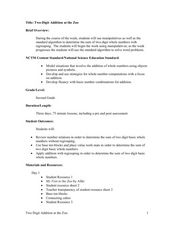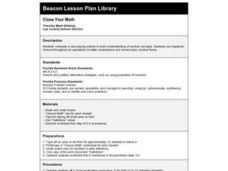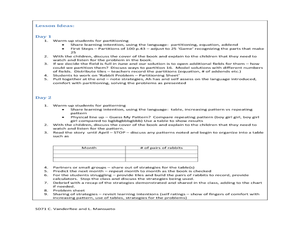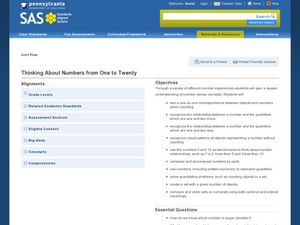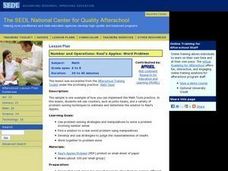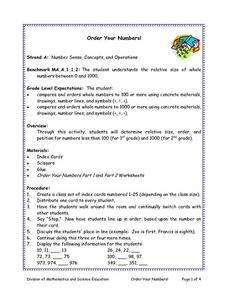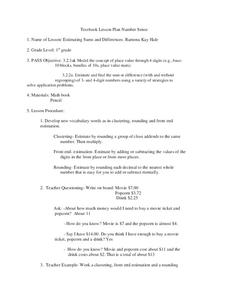Curated OER
Two-Digit Addition at the Zoo
Your second graders explore two digit addition with regrouping. They will investigate problem solving strategies within the context of a trip to the zoo. Multiple resources and assessments are provided.
EngageNY
Percent Error Problems
Individuals measure a computer monitor and determine how accurate their measures are. The eighth segment in a series of 20 introduces the concept of percent error. Pupils find the percent error of their measurements and discuss the...
Curated OER
Number Sense
Students play "Fraction Line Up," a game to compare fractions with unlike denominators with the use of a deck of cards. After the game, each player explains one of the strategies that was helpful to him/her during the game. In...
Curated OER
Subtraction-There's Got to be An Easier Way!
Third graders observe and demonstrate a variety of problems involving subtraction problems using mental math strategies. They discuss the base ten system and the basic concept of subtraction, and complete a variety of activities...
Curated OER
All A-buzz About Math
Second graders participate in Math-Eze activities to comprehend word problems. In this word problem instructional activity, 2nd graders recognize why a hexagon is the best shape for a beehive. Students calculate how far bees must travel...
Curated OER
Operation Spaghetti
Find the math in recipes. Young chefs will follow a recipe and investigate the total cost for materials. They measure amounts of food necessary for the recipe and compute the per person cost.
West Contra Costa Unified School District
Factoring Quadratic Expressions
Factor in different strategies in a lesson for factoring quadratics. Young mathematicians first create tables and area models to factor quadratic trinomials into two binomials by guess and check. Learners then investigate how they can...
Mathematics Assessment Project
Deducting Relationships: Floodlight Shadows
Try to figure out what happens with shadows as a person moves between two light sources. A formative assessment instructional activity has individuals work on an assessment task based on similar triangles, then groups them...
Curated OER
Make a Match
Second graders examine the relationship between addition and subtraction. In this number sense instructional activity, 2nd graders practice their computation skills and use various strategies (including manipulatives...
Curated OER
Close Your Math
Fourth graders complete a role playing activity to build understanding of number concepts. They use Algebraic Closure throughout six operations to better comprehend and review basic number theory. They utilize a worksheet imbedded in...
Curated OER
The Rabbit Problem
Students notice a number pattern in the book The Rabbit Problem by Emily Gravett. In this number pattern lesson, students represent and describe numbers appropriate to their grade level.
Illustrative Mathematics
Representing Half of a Circle
Geometric shapes make great visual models for introducing young mathematicians to the concept of fractions. Looking at a series of four circles, learners are asked to determine whether or not one half of each circle is shaded. To support...
Pennsylvania Department of Education
Thinking About Numbers from 1 to 20
Help your kindergarteners discover new number-sense concepts and to compose and decompose numbers. Though the resource contains no procedural details, the assessment tool (which you can find in the "printer friendly version") has...
Curated OER
Number and Operations- Raul's Apples: Word Problem
Students discover how they can use manipulatives to solve word problems. In this problem solving instructional activity, students read Raul's Apples Problem and then complete a worksheet, using beans or counters to solve the problem....
Curated OER
Order Your Numbers
Students examine the order of whole numbers that range from 0 to 1,000. They compare and contrast the quantities of different numbers using the number line, objects, and symbols of comparison. Students also work as a class with cards to...
Curated OER
The Difference Bar 1
Students use mental strategies to work out the difference between 2 two-digit numbers where the answer is less than ten. They write and solve difference problems where one number is a two-digit number and the other is a single digit...
Curated OER
Math Prefixes
Students use a dictionary to gather appropriate information for writing simple definitions. They recognize prefixes that relate to numbers, such as mono-, bi-, and tri-. Pupils use their creative abilities to extrapolate new words to...
Curated OER
Number Push-ups
First graders integrate math with an upper body movement exercise. Students practice the proper push-up position. The teacher spreads paper numbers in front of the students. (Begin with the numbers 1-9.) Students must "walk" in a push-up...
EngageNY
TASC Transition Curriculum: Workshop 8
Lights, camera, action! Math educators consider how to improve their instruction by examining a model of the five-practice problem-solving model involving a movie theater. Participants examine cognitive demand in relation to problem...
Curated OER
Problem Solving: Steps and Strategies
Students explore the concept of problem solving strategies. In this problem solving strategies lesson, students discuss methods for solving problems such as re-reading a problem, stating the facts, drawing a picture and so on. Students...
Curated OER
Mind Your Pints and Quarts: Making Sense of Liquid Measurement
Elementary and middle schoolers identify different units of liquid measurement. They use the online Visual Thesaurus to learn about the relationships between units of liquid measurement.
Curated OER
Improving Deductive Reasoning Skills
Students develop a strategy list for problem solving by working with different types of problems. They recognize problems that may be solved using deductive reasoning and solve deductive reasoning problems.
American Statistical Association
Chunk it!
Chunking information helps you remember that information longer. A hands-on activity tests this theory by having learners collect and analyze their own data. Following their conclusions, they conduct randomization simulations to...
Curated OER
Number Sense
First graders practice rounding 4 digit numbers using place value concepts. In this estimating sums and differences lesson, 1st graders explore clustering, rounding, and front end estimation as methods for rounding decimals.
